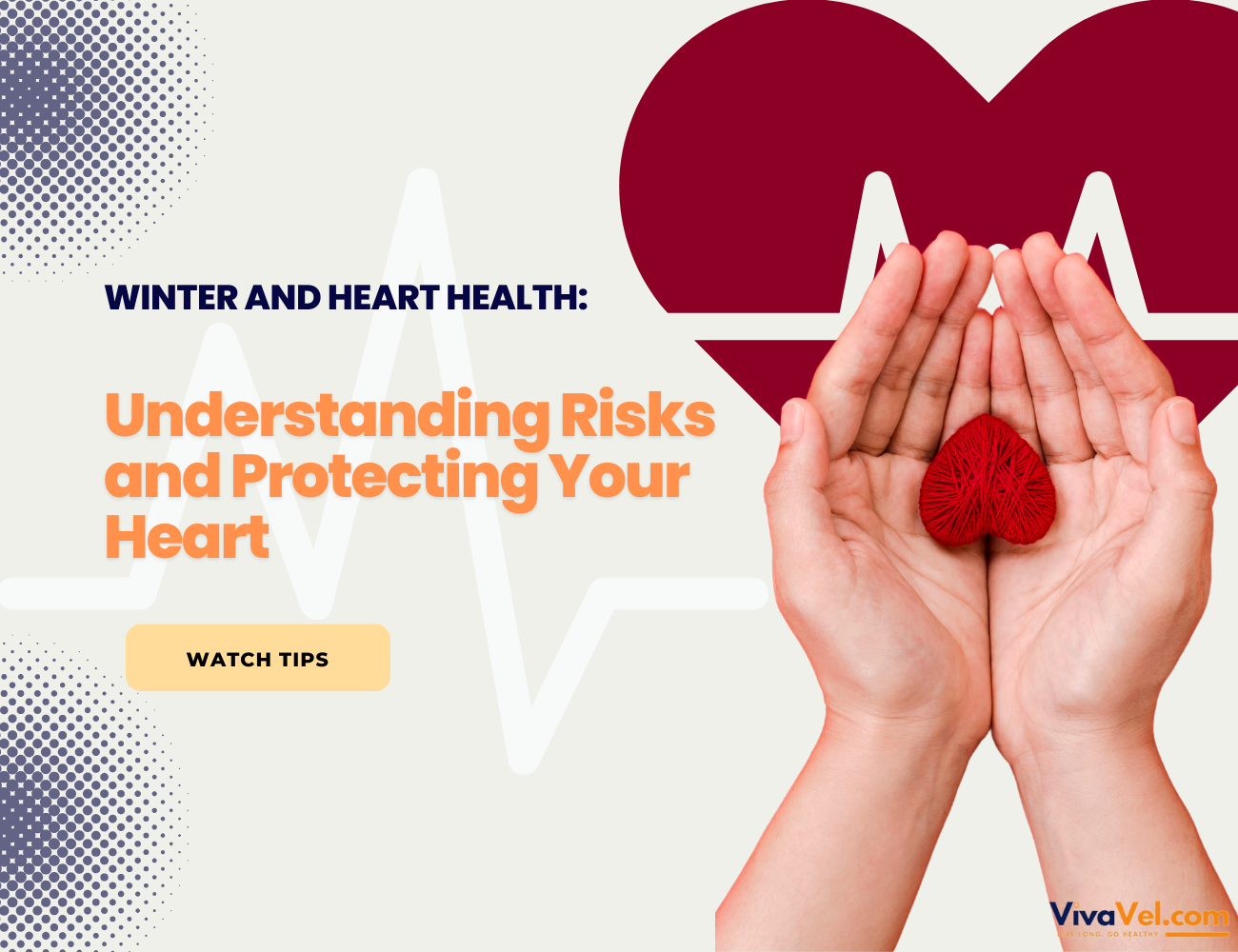
Home / Information / Blog / Blog Detail

As the cold winds blow and temperatures drop, we often think of staying warm and cozy. However, winter also brings significant health risks, especially regarding our heart health. Studies have shown that heart attacks are more common during the winter months, and there are several reasons behind this phenomenon. In this blog, we will explore why heart attacks increase in winter and what steps you can take to safeguard your heart.
1. Impact of Cold Weather on Heart Health
Heart attacks are more common in winter due to the effect of cold temperatures on the body. When temperatures drop, blood vessels constrict, making it more difficult for blood to flow freely. This constriction of the blood vessels increases blood pressure, making the heart work harder. For people with pre-existing heart issues, this additional burden can be the tipping point that leads to a heart attack.
Furthermore, cold weather triggers the release of stress hormones like adrenaline. These hormones elevate your heart rate and blood pressure, putting additional stress on the heart. In people with underlying heart disease, this extra pressure can lead to a dangerous situation where the heart is unable to pump blood effectively, potentially resulting in a heart attack.
2. Reduced Physical Activity in Winter
During the winter months, individuals often prefer to remain indoors more often. This reduction in physical activity can significantly affect heart health. Regular exercise is essential for maintaining a healthy heart by enhancing blood circulation, reducing blood pressure, and minimizing cholesterol levels. When individuals become less active during the winter, these benefits are lost, increasing the risk of heart problems.
Furthermore, if you are not accustomed to regular exercise, jumping into intense activities—like shoveling snow or lifting heavy items—can impose unexpected stress on the heart, particularly in chilly weather. This sudden exertion in freezing conditions can trigger a heart attack in vulnerable individuals.
3. Winter and Increased Blood Clotting Risk
Cold weather can increase your blood’s tendency to clot, increasing the risk of heart attacks. In response to the cold, your body naturally produces more clotting factors to prevent excessive bleeding from minor injuries. However, these clotting factors can also contribute to plaque formation in your arteries, leading to a blockage. A blood clot in a coronary artery can obstruct blood flow to the heart, resulting in a heart attack.
This risk is even higher for individuals with plaque buildup in their arteries (atherosclerosis). During winter, the body’s natural response to the cold can elevate the chances of the plaque rupturing and causing a blockage in the arteries supplying blood to the heart.
4. Winter Weather and Respiratory Infections
Cold weather can also increase respiratory infections such as the flu or pneumonia. These infections can strain the heart, especially if you already have heart disease. When you have a respiratory infection, your body’s oxygen demand increases, making your heart work harder. Additionally, inflammation caused by these infections can cause further strain on the heart, potentially triggering a heart attack.
Taking precautions during winter, such as getting your flu vaccine, washing your hands frequently, and staying warm to prevent illness, is essential. These simple steps can help lower your risk of respiratory infections and help protect your heart.
5. Holiday Stress
The holiday season often overlaps with the colder months and brings unique stresses. The mental and emotional burdens can negatively affect your heart health, whether it's the pressure of shopping, cooking, or attending family gatherings. Stress causes an increase in cortisol, a hormone that can raise blood pressure and heart rate. Over time, chronic stress can lead to heart disease.
Managing stress is essential throughout the year, especially in winter when weather, reduced activity, and holiday pressures can negatively affect your heart. Engaging in relaxation techniques, such as meditation, yoga, or deep breathing exercises, can help to reduce stress and keep your heart healthy.
6. How to Safeguard Your Heart in Winter
As the winter season sets in, its chilly embrace brings along certain risks for your heart health. There are several ways you can reduce the chances of experiencing heart-related problems during this season:
Dress Warmly: Layer your clothing effectively to combat the biting cold. Choose insulating materials like wool and fleece to help retain your body heat. Maintaining a comfortable temperature can prevent sudden drops in warmth that may strain your cardiovascular system.
Stay Active: Try to get outside for a walk during the day when the sun is shining or engage in indoor exercises like yoga or stretching. Staying physically active uplifts your mood and fortifies your heart against winter’s challenges.
Monitor Your Blood Pressure: Monitor your blood pressure regularly. If you have a history of high blood pressure or heart disease, consult your healthcare provider for tailored strategies to manage your blood pressure effectively throughout winter.
Avoid Overexertion: Physical tasks can become more difficult when temperatures drop. Take a moment to breathe and pace yourself, especially when shoveling snow or lifting heavy items. Sudden bursts of exertion in cold conditions can put additional strain on your heart, so approach these tasks with caution and care.
Get Vaccinated: Protect yourself from respiratory infections by getting the flu shot and maintaining good hygiene, such as regular handwashing, to keep illnesses at bay. A healthy body is better equipped to support heart function.
Eat Heart-Healthy Foods: During the colder months, focus on eating a balanced diet rich in vibrant fruits, leafy vegetables, whole grains, and healthy fats to support your heart health. Foods such as avocados, nuts, and fatty fish can provide vital nutrients that support heart health, even in chilly weather.
Conclusion:
Winter can present serious challenges to your heart health due to cold temperatures, decreased physical activity, and heightened stress levels. By understanding the factors contributing to a higher risk of heart attacks during this season, you can take proactive steps to protect yourself. Whether it involves staying active, monitoring your blood pressure, or carefully managing stress levels, embrace these small changes. They can substantially improve maintaining and nourishing your heart health through the long winter months.
Written By: Saba Yasmin

As winter sets in with its chilly weather, many individuals who have arthritis find that their joint pain and stiffness intensify. The cold and damp conditions often aggravate arthritis symptoms, leading to increased discomfort that can hinder daily activities. For those affected by arthritis, gaining insight into the reasons behind these winter flare-ups and discovering effective management strategies can significantly enhance comfort and overall quality of life.

Winter is a season that brings a unique charm with its frosty mornings and festive spirit. Yet, it also presents specific challenges impacting our physical and mental well-being. The cold weather can make it harder to stay active, and shorter days can lead to increased stress or feelings of isolation. Consider some practical tips to navigate these winter hurdles and maintain your health and happiness. Focus on staying warm, finding ways to keep active indoors or outdoors, and managing stress through mindfulness or social activities. Embracing these strategies can help you enjoy this magical season to its fullest.

Winter is here! While it brings cozy sweaters, hot cocoa, and festive cheer, it also presents unique challenges for your skin. The drop in temperature, coupled with low humidity and indoor heating, can deplete your skin of its natural moisture, leading to dryness, flakiness, and irritation. However, with the proper skincare routine and tips, you can maintain a radiant, healthy complexion all winter. Here's a comprehensive guide to winter skincare:
STEP 1
Let us know your details and preferences. We maintain absolute data confidentiality. All your health records are safe, and privacy is maintained.
STEP 2
A dedicated counsellor will help you with the Best Hospital & Doctors at the lowest possible Prices.
STEP 3
While you decide on the treatment plan, we assist you with priority appointments, Visa, Documentation, Hotel & other Logistics.
STEP 4
Our team assists you with all your local requirements like Hospitalization, Hotel Stay, Transportation, Food, Forex, Lab Tests, Medicines, etc.
STEP 5
We ensure a smooth discharge process. We also assist you in tallying your bills at the hospital, all necessary documentation, and your return trip.

"VivaVel" has truly made a life-changing impact on our lives during a challenging time. My wife was diagnosed with Polycystic Ovarian Disease (PCOD), and despite consulting three different doctors in Bangladesh, we were unsatisfied and uncertain about the way forward. It was a confusing and challenging phase until a friend recommended VivaVel.
From the moment "I contacted them", VivaVel provided exceptional support and guidance. They arranged telemedicine consultations with two renowned international doctors, giving us the confidence to make an informed decision. After careful consideration, we selected one of the doctors for my wife's treatment.
VivaVel's assistance went above and beyond our expectations. They helped us with critical processes like obtaining a medical visa invitation letter, visa processing, and coordinating my wife's admission to "Artemis Hospital" in Delhi. They even suggested comfortable accommodations for me as a patient attendant.
What truly stood out was their unwavering support throughout our journey. The "VivaVel team" was always just a phone call away, offering guidance and reassurance during our stay in Delhi. Their professionalism and dedication to helping patients and their families are truly commendable.
I am incredibly grateful for the care and support from "VivaVel." They were a beacon of hope for us during this difficult time, and I sincerely hope they continue their outstanding service to help more needy patients.
Thank you, "VivaVel," for being there for us every step of the way!
Mr. Hoque, Dhaka, Bangladesh
Patient name: Shanta Islam, Dhaka, Bangladesh

Note : VivaVel does not provide medical advice, diagnosis or treatment. The services and information offered on www.vivavel.com are intended solely for informational purposes and cannot replace the professional consultation or treatment by a physician. All Copyrights are reserved with VivaVel. VivaVel does not allow copying and cloning of its webpages and contents. VivaVel reserves the right to follow the legal procedures to protect its intellectual property.
Copyright © 2024 VivaVel.com . All Rights Reserve.




